
Since its introduction, UAE VAT implications on car buying have been confusing and complex for buyers. But regardless of the complexity, understanding car tax in the UAE is very important, especially for car industry specialists and consumers. In this article, we will answer some of the most common questions concerning VAT for used cars in the UAE, explain how it affects buyers, and provide additional details on exporting cars. We will also share a few important VAT key points to keep in mind.
What is VAT?
VAT is a general consumption tax that is applied to the majority of transactions for goods and services. Simply put, VAT is the added value you, as a buyer, have to pay in addition to the original price of the goods or the service you are purchasing or receiving. In the UAE, VAT was introduced in 2018 at a standard rate of 5%, which also applies to the automotive sector, including the sales of both new and used cars.
Is There Tax on Cars in Dubai?
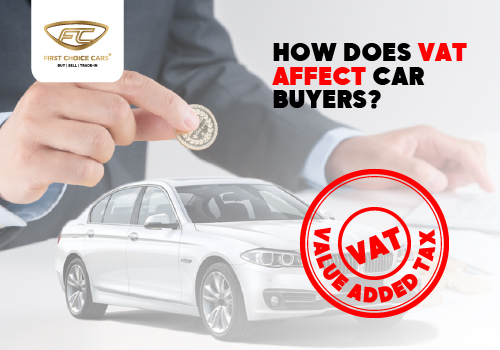
Yes, with the VAT introduced in the country, there is now an official tax on used and new cars in Dubai as well as in other emirates. Let's see some technical details and essential tax implications when buying a car in the UAE. It is important that you familiarize yourself with how VAT applies to better anticipate the total cost and ensure you are aware of potential savings or limitations.
- VAT Inclusion in Prices: Typically, the price displayed by car dealers includes VAT on the vehicle. This is crucial for personal car buyers to know, as it affects the overall cost of the car. It's always a good idea to confirm with the dealer whether the displayed price includes VAT.
- VAT Rate and Price Display: The standard Dubai car tax rate of 5% applies to the sale of new and used cars. Prices displayed by dealers must be VAT-inclusive to provide clear information to buyers about the total cost payable. This ensures transparency in pricing and allows buyers to make informed decisions.
- Profit Margin Scheme for Used Cars: Dealers often use the Profit Margin Scheme for used cars, where VAT is charged not on the full selling price but on the profit margin of the dealer. This scheme is beneficial for both dealers and buyers, as it generally results in a lower VAT amount being payable compared to calculating VAT on the total sales price.
- Conditions for Profit Margin Scheme: Specific conditions must be met for a dealer to apply the Profit Margin Scheme. The car must have been purchased from a non-taxable person or a taxable person who also used the Profit Margin Scheme. It's crucial for buyers to understand that this scheme may affect the documentation and pricing structure of their purchase.
- Tax Invoices: Dealers must issue a tax invoice for all standard-rated supplies, including used cars sold under the Profit Margin Scheme. For sales under this scheme, the invoice should clearly state that VAT was calculated on the profit margin.
- No VAT Credit for Consumers: If you are buying a car for personal use, you cannot reclaim any VAT paid on the purchase. This contrasts with VAT-registered businesses, which can reclaim VAT as input tax.
- Documentation and Invoices: Ensure you receive a proper tax invoice upon purchasing a car. This is crucial for your records, even though you cannot reclaim VAT. The invoice should clearly mention the VAT amount and confirm whether the Profit Margin Scheme has been applied.
VAT for Personal Car Buyers
Personal car buyers should be aware of the VAT on second hand used cars as this might affect their decision when purchasing. In order to better understand what to expect, here are some key points to remember:
- Always check whether the price includes VAT.
- Understand the implications of the Profit Margin Scheme.
- Keep all VAT-related documentation for your records.
Why Should I Know About VAT?
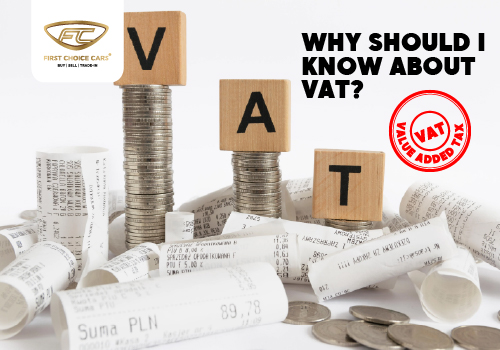
Understanding VAT elements is necessary because it affects the final amount you pay and ensures transparency in your transactions. On the other hand, knowledge of VAT rules can also protect you from potential overcharges and help you make more informed decisions.
Navigating VAT as a personal car buyer doesn't have to be complicated. Armed with the correct information, you can make purchases that are not only compliant with the law but also the best fit for your budget and needs.
VAT for Car Buyers in the UAE
Vehicle tax in Dubai and the UAE might seem like a complex issue for some, but it is crucial to understand its implications to be able to choose a suitable car model without additional purchasing costs. Considering there is a second hand car tax as well as Tax on new cars, staying informed on the VAT rules in the UAE will help you make a cost-effective decision.
Let's look at how VAT comes into play when purchasing, financing, or leasing a car:
Outright Purchases vs. Hire Purchase Agreements
- Outright Purchases: If you have the means to buy a car outright, the Tax on car sales is applied at the time of purchase based on the total price of the vehicle.
- Hire Purchase Agreements: For those opting for hire-purchase, VAT is more complex. The total amount payable (including the finance charge) is subject to VAT, which is spread out across the payment schedule.
Essential Tips for Buying a Used Car in the UAE
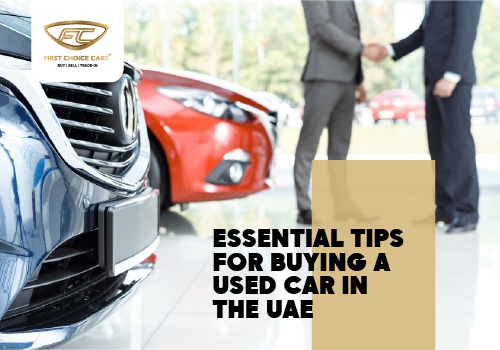
When buying a second-hand vehicle in the UAE, it is crucial to understand the differences in VAT application depending on who you are buying from:
From a Dealer:
Always ensure you receive a Tax Invoice from the dealer. This invoice proves that second hand car tax has been paid, which is crucial for documentation and future resale.
From the First Owner:
When buying a car from a private seller, ask for the original car Tax invoice. This document will confirm that the Tax on a car has been paid. Additionally, request a copy of their registration card and Emirates ID to help verify the seller's identity and ownership of the vehicle.
Benefits for Future Resale:
The original tax invoice from the dealership or from the first owner, along with the registration copy and Emirates ID, will be beneficial when you decide to sell the car. It proves that VAT has been paid, making it more attractive to potential buyers and helping you secure a better resale price. The Tax on resale of a car has to be paid by the car buyer, and it will typically be included in the overall price.
VAT and Trade-ins
VAT on imported cars in the UAE is also at 5%. The Tax on imported cars applies based on customs value, which includes cost, insurance, and freight. However, if you're registered for VAT and meet certain conditions, you might defer this payment until your VAT filing.
VAT on Leased Cars
Leasing a car also attracts VAT at the standard rate of 5%. The same VAT principles apply, whether it's a short-term or long-term lease. Remember that, in this case, any additional charges, such as for tolls or damages, are also subject to VAT.
VAT on Imported Cars
Importing a car outside of the UAE also attracts VAT at 5%. The VAT then applies based on the customs value, which includes cost, insurance, and freight. However, if you're registered for VAT and meet certain conditions, you might defer this payment until your VAT filing.
VAT Implications for Car Transactions in the UAE
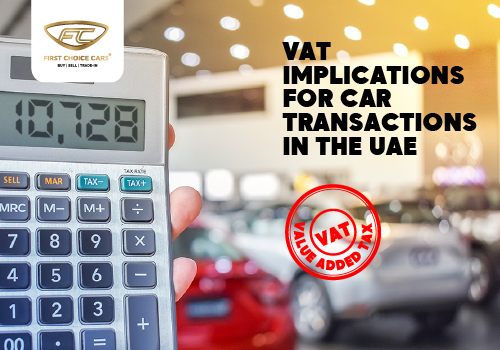
VAT has been established for a couple of years now, and both residents and tourists are aware of its existence. With VAT being applied to every transaction, car buying and selling is no exception. However, car tax in Dubai and the UAE will differ on the type of transaction and other factors.
1. Standard Rate (5%)
New Cars: For a new car bought directly from a dealership, the standard VAT rate of 5% is applied to the total price of the vehicle.
Used Cars from Dealerships: A dealership selling a used car may apply the standard VAT rate to the total sale price unless the Profit Margin Scheme is used.
VAT on company vehicles in the UAE: If a business is registered, it may recover VAT for rentals, leases, and purchases of motor vehicles used exclusively for business purposes.
2. Profit Margin Scheme for Used Cars
VAT on company vehicles in the UAE: If a business is registered, it may recover VAT for rentals, leases, and purchases of motor vehicles used exclusively for business purposes.
Conditions: The car must have been purchased from a non-taxable person or another taxable person using the Profit Margin Scheme.
3. VAT on Trade-Ins
When trading in an old car for a new one, VAT is applied to the full price of the new vehicle before deducting the trade-in value. The trade-in value itself is not subject to VAT.
4. VAT on Car Imports
For cars imported from outside the UAE, a 5% VAT is applied based on the customs value, which includes the cost, insurance, and freight. This is payable upon importing the car into the country.
5. No VAT for Private Sales
If you purchase a used car from a private individual (not a business), no VAT is charged, as private sellers are not VAT-registered.
6. VAT Documentation
It's essential to obtain a tax invoice when buying from a dealership, as this is proof that VAT has been paid, which can be beneficial for future resale and legal compliance.
VAT Implications for Car Exports
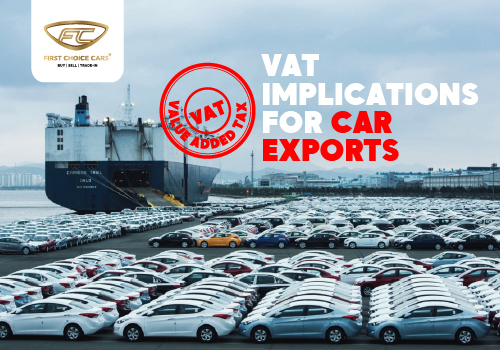
The Tax for exporting cars from the UAE involves special regulations and documentation. If you are in this business, it is essential to familiarize yourself with the export VAT implications to avoid unexpected costs.
1. Zero-Rated VAT for Exports:
If the car is exported from the UAE to a country outside of its borders, there is typically zero Tax. This means no VAT is charged on the transaction at the time of sale, provided certain conditions are met. This, however, does not exclude paying a VAT percentage in the country of import.
Conditions for Zero-Rated VAT:
The car must be physically exported out of the UAE within 90 days from the date of supply.
Proof of export must be provided, including an Export Declaration, proof of transport, and confirmation of arrival in the destination country.
2. Required Documentation for Zero-Rated VAT:
Export Declaration:
This document is issued by UAE Customs and confirms that the vehicle has been declared for export. It must be obtained before the vehicle leaves the UAE and should include details such as the vehicle's make, model, VIN, exporter information, and total value.
Proof of Transport:
This varies depending on the mode of transport:
- Sea Transport: Bill of Lading issued by the shipping company.
- Air Transport: Airway Bill issued by the airline.
- Land Transport: The Transport Company agreement and Invoice confirming the vehicle's details and destination.
Exit Certificate:
Issued and stamped by customs authorities at the point of exit (border checkpoint or port). Confirms that the vehicle has physically left the UAE.
Proof of Arrival for Oman and KSA:
Documentation confirming the vehicle's arrival in Oman or KSA may include an import declaration, Vehicle Clearance Certificate (VCC), or a copy of the Registration Card, applicable only to these neighbouring countries.
3. Consequences of Non-Compliance:
If the vehicle is not exported within 90 days or the necessary documentation is not provided, the sale will not qualify for zero-rated VAT, and a standard 5% VAT will be due on the transaction.
Inaccurate or incomplete documentation can result in fines or penalties from the FTA, and the exporter may be required to pay the VAT amount due.
Conclusion
VAT for car transactions in the UAE isn't as complex as it might seem. In order to understand how VAT works in Dubai and other emirates, all it takes is some research. In case you are unsure of the Tax procedure or documentation, it is advisable to contact a tax advisor in the UAE or a legal professional to assist you through the process.
Tax for buying, selling, or exporting a car in UAE is set by the government and some expect it could rise in the coming years, considering the growth of the country and the influx of foreigners. Since its introduction, it has been stagnant at a low 5%, which attracts people from all over the world to not only live here but also to drive luxurious cars for a fraction of the price. Tax on luxury cars in Dubai isn’t a burden for buyers, making them more accessible and affordable for regular audiences, not only affluent individuals.
If you're unsure how to proceed with a car purchase or export, seeking professional assistance is recommended. We at First Choice Cars have extensive experience in car selling and buying in the UAE. Our knowledgeable team can help you find the right vehicle to suit your needs and budget while managing all VAT-related and export documentation to ensure a smooth transaction.
Disclaimer: All information, including pricing, vehicle details, and legal requirements, is accurate at the time of publication but may be subject to change due to market conditions or policy updates. While First Choice Cars makes every effort to ensure the accuracy of the information provided, we hold no responsibility for any errors, omissions, or outdated content. We recommend contacting our team directly to confirm the latest details before making any decisions.
